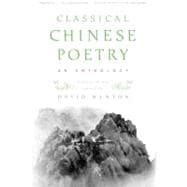
What is included with this book?
David Hinton’s translations of classical Chinese poetry have earned him a Guggenheim fellowship, numerous NEA and NEH fellowships, and both of the major awards given for poetry translation in the United States, the Harold Morton Landon Translation Award, from the Academy of American Poets, and the PEN Award for Poetry in Translation, from the PEN American Center. He is also the first translator in over a century to translate the four seminal works of Chinese philosophy: the Tao Te Ching, Chuang Tzu, Analects, and Mencius. He lives in Vermont.
The New copy of this book will include any supplemental materials advertised. Please check the title of the book to determine if it should include any access cards, study guides, lab manuals, CDs, etc.
The Used, Rental and eBook copies of this book are not guaranteed to include any supplemental materials. Typically, only the book itself is included. This is true even if the title states it includes any access cards, study guides, lab manuals, CDs, etc.